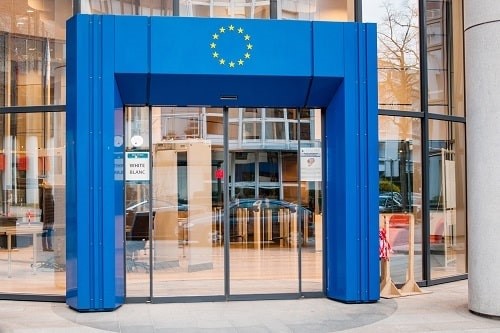I am a lifelong trade unionist. At the heart of trade unionism lies negotiating deals with employers and sometimes governments. The beauty of it is that you can create a deal that benefits everyone – workers and employers. It’s messy, it’s complicated but there’s something in it for everybody.
Opinion
Fighting for a health and safety level playing field
And for all its faults the EU, itself the child of negotiations (between national governments), has given us a single market of huge benefit to business, balanced by basic social, consumer and environmental protections of huge benefit to working people and citizens. It’s, of course, more complex than that, and I have long argued that economic rights have for far too long outweighed social and other rights. But the potential for all to benefit from an EU social market economy is clear to see.
In contrast – and the reason I am so saddened by it – is that Brexit brings no benefit to anyone, except perhaps a few very wealthy individuals, and major risks of many kinds to working people and to business.
The European Trade Union Confederation and British TUC have worked together throughout the sad and frankly often-deluded Brexit debate, arguing above all for a level playing field for workers’ rights. What we want is that the UK cannot undercut EU standards, and British workers must have a robust guarantee against falling behind EU workers and becoming second class citizens. This level playing field needs to apply not just during a transition period but be the central plank of the yet-to-be-negotiated future long-term relationship.
This is an obvious and stark contrast to a number of British Conservative politicians who are on record as promoting Brexit as an opportunity for major deregulation.

Strasbourg, France, the entrance to Council of Europe European Union
One of many areas in which deregulation is a clear and ever-present risk is health and safety. The EU has over 30 pieces of legislation in health and safety including exposure to chemical, physical and biological hazards, and covering protective equipment, signs, etc. There are also complex arrangements for registration of chemicals, nuclear safety and others.
In a post-Brexit UK, such EU legislation is at risk after any transition period, should there be one. Probably most at risk is the Working Time Directive. But who can say with confidence what would not be at risk? This is a problem not just for UK workers, but risks pressure for deregulation across the EU.
Even without a deregulatory approach from the UK there is a major risk that regulatory ‘divergence’ will occur, unless a binding commitment is made to avoid it. Given their long implementation times it is questionable whether new EU workplace-exposure limits to diesel exhaust, respirable crystalline silica and chrome plating will ever be implemented in the UK.
The revision of six EU occupational health and safety directives are currently at various stages of development, including on personal protective equipment in the workplace, display screen equipment and exposure to biological agents at work. All unlikely to enter UK law, and possibly yet another reason for some EU governments to resist improved standards for EU workers.

ETUI: the EU should adopt a target of zero workplace cancer that would drive new legislation on carcinogens.
REACH is widely regarded as the world’s most progressive law regulating the marketing of chemical substances and sets a standard for industries across the globe. But the UK is already committed to developing a new chemical regulatory system to replace REACH after Brexit. It is impossible to believe that without a binding commitment to maintain the same standards that the EU’s REACH and a separate UK system will generate identical results.
Again, this regulatory divergence is unlikely to be a problem only for British workers but could lead to demands for deregulation across the EU.
The European trade unions – including the British TUC and Irish ICTU – have a clear idea of the future protections we want health and safety legislation to offer. To give one example we believe the EU should adopt a target of zero workplace cancer that would drive new legislation on carcinogens. We want a directive on stress, new measures on musculoskeletal disorders, and a greater emphasis on empowering unions in workplaces to act on health and safety.
Will it be a race between British unions to persuade their government to adopt these actions, and European trade unions to convince the EU? Would the same measures be adopted in the UK and the EU? It seems unlikely.
A level playing field for EU and British workers at the core of the future relationship would fix all these problems, and would benefit workers in the UK and the EU, as well as make life simpler for businesses across our continent.
We must not allow our frustration and disappointment about Brexit – or our Brexit-exhaustion – stop us from fighting for that level playing field from the start to the end of the still-to-come negotiations on the future relationship between the EU and the UK.
OPINION

The air we breathe is all our business
By Nicky O’Malley, director of corporate partnerships, Global Action Plan on 01 June 2023
Businesses have a vital role to play in improving air quality – and the UK’s Clean Air Day on 15 June is a great opportunity for companies to begin or renew their efforts in this area.

All jobs greener: why we need workforce transformation for a sustainable future
By Martin Baxter, deputy CEO, IEMA (Institute of Environmental Management & Assessment) on 01 June 2022
The shift to a green economy will create green jobs within new and emerging sectors, while those working in existing sectors will have to gain the requisite green skills to take advantage of the business value-creation opportunities that come from embedding sustainability across the whole organisation.

Preventing chemical pollution: how the UK is falling behind Europe
By Ruth Jones MP for Newport West & Shadow Minister for Agri-Innovation and Climate Adaptation on 01 June 2023


